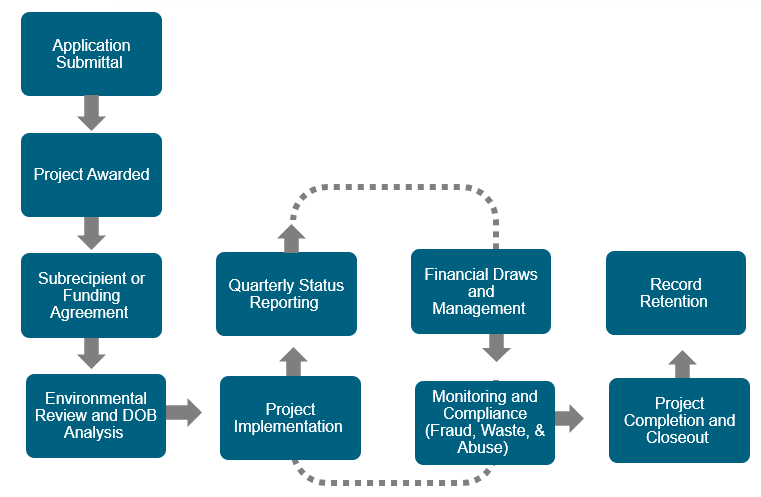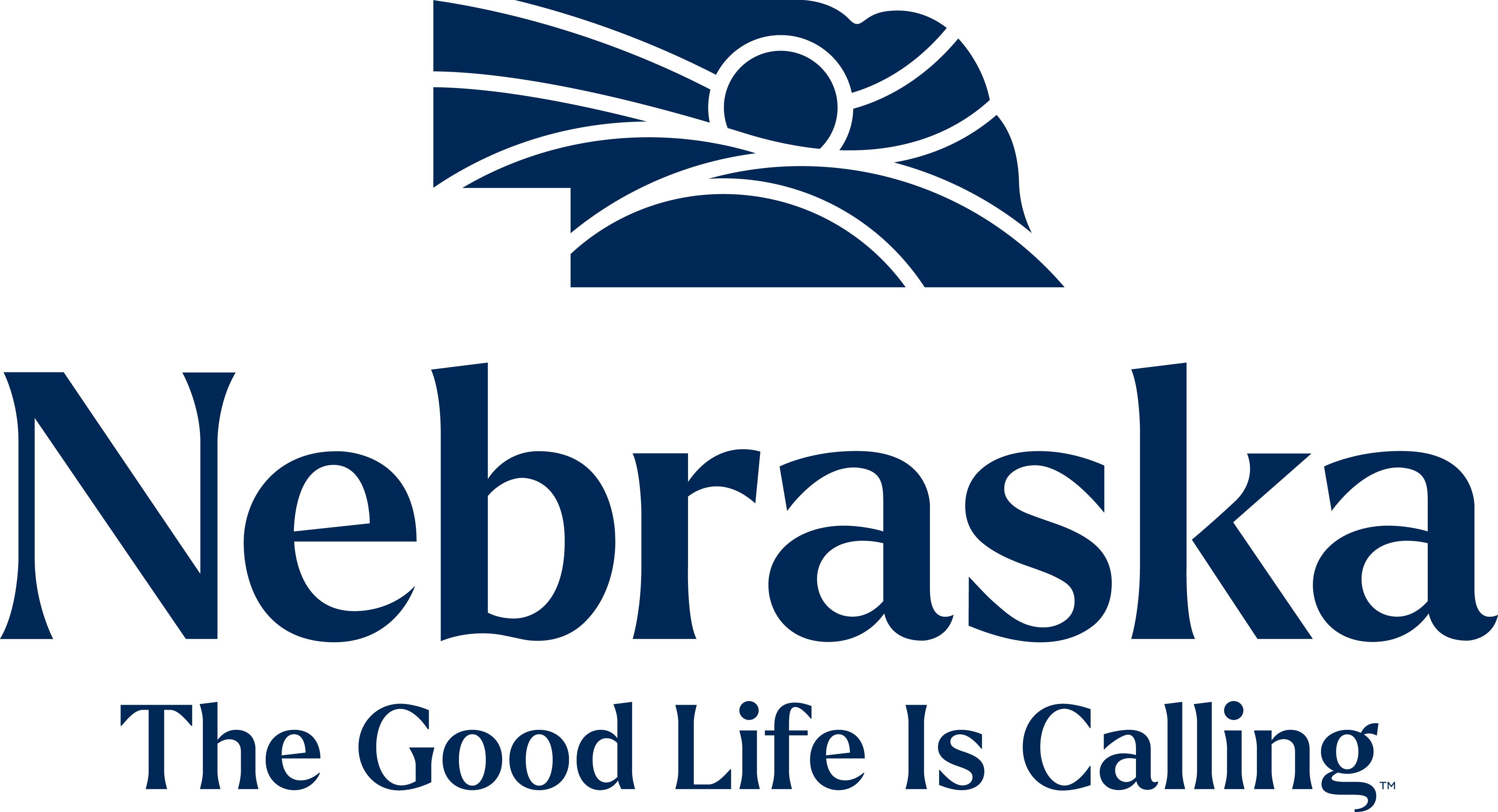Subrecipient and Successful Applicant Resources

What is a Subrecipient?
-
Subrecipients are public or private nonprofit agencies, authorities, organizations or community-based development organizations receiving CDBG-DR funds from the recipient or another subrecipient to undertake CDBG-DR eligible activities (see 24 CFR 570.500 (c));
-
A non-Federal entity that receives a sub-award from a pass-through entity to carry out part of a Federal program (see 2 CFR 200.93); or
-
An agency partner in disaster recovery.
DED’s Infrastructure Match program is expected to be implemented by Subrecipients.
What is a Successful Applicant?
Successful Applicants include any eligible entity that is selected to enter into a funding agreement (e.g. funding agreements govern the funding and activities for Successful Applicants) with DED to implement CDBG-DR program activities (e.g., for-profit developers). DED’s housing and planning programs are expected to be implemented by Successful Applicants.
The Lifecycle of a Subrecipient or Successful Applicant

Application Submittal
Applications must be fully completed based on the the programs specifications. If additional information has been requested, this should be provided timely as this will be needed to analysis the project for awarding.
Applications will be reviewed for the following:
-
Eligibility;
-
National objective;
-
Budget; and
-
Scope of work.
Project Awarded
After DED conducts a thorough review of the fully submitted application, any project that is selected for award will be notified.
Subrecipient Agreement / Funding Agreement
Once a project has been awarded DED will work with the awarded entity on crafting the Subrecipient Agreement for execution.
This agreement is a legal document between the awarded entity and DED. Housed within this document are the following:
-
Subrecipient and Successful Applicants roles and responsibilities;
-
Funding amount and project budget;
-
Scope of Work (SOW);
-
Project implementation schedule;
-
Reporting requirements; and
-
Record requirements.
Environmental Review Process and DOB Analysis
Environmental Review Process
Subrecipients and Successful Applicants are responsible for compliance with federal environmental review requirements (24 CFR Part 58).
An Environmental review must be performed before any funds, regardless of source, are committed to an activity or project. No activity or project may be undertaken if the activity or project would have adverse environmental impact or limit the choice of reasonable alternatives (24 CFR 58.22 (a)).
Therefore, Subrecipients and Successful Applicants are required to complete their environmental reviews, Request for Release of Funds (RROF’s) and clearance -related paperwork before:
-
Any commitment of CDBG-DR funds for activities or projects; and
-
Any commitment of non-CDBG-DR funds that would have an adverse environmental impact or limit the choice of alternative
DOB Analysis
Duplication of Benefits (DOB) occurs when a person, household, business , government, or other entity receives financial assistance from multiple sources for the same purpose, and the total assistance received for the purpose is more than the total need for assistance.
Project Implementation
Project Implementation specifies a timeframe for milestones in the project schedule.
Quarterly Status Reports
Quarterly status reports are away for DED to track the progress of a project on a quarterly bases. These reports are also used by DED to do high level quarterly reporting to HUD.
Financial Draws and Records Management
Financial Draws
All Subrecipients and Successful Applicants will receive training on DED’s financial system AmpliFund.
-
All reimbursements will be submitted through the AmpliFund system;
-
All draws are reimbursements of deliverables or tasks that have been completed; and
-
Complete reimbursement documentation must be provided prior to requests being approved.
Records Management
All Subrecipients and Successful Applicants are required to maintain a full and current set of all project-related documents in their primary office location and these documents must be available upon request. This includes maintaining compliance with the following:
-
All Subrecipients and Successful Applicants must be familiar and adhere to all Freedom of Information Act (FOIA), as appropriate;
-
All Subrecipients and Successful Applicants must delegate a person responsible for records management;
-
Subrecipients and Successful Applicants are required to maintain records required by 24 CFR 570.506;
-
Specific documentation maintained may vary depending on the project type or activity however, files should be comprehensive and up-to-date;
-
Project files should cover all aspects of the project beginning with application, eligibility, and cost allowability and end with program closure; and
-
All files that contain Personally Identifiable Information (PII) and sensitive PII, such as social security numbers must be stored in a secure place.
Monitoring and Compliance
Monitoring is a HUD requirement to evaluate all awarded projects for CDBG-DR statutory and regulatory requirements ( see 24 CFR 570.501(b)).
Monitoring will consist of on-site and desktop monitoring.
The purpose of monitoring is to:
-
Gauge the overall project progress;
-
Provide information about project participants that is critical for making informed judgments about the project’s effectiveness and management efficiency;
-
Serve as a project management tool to identify risks and issues;
-
Serve as a technical assistance tool to DED to show areas where service delivery quality can be strengthened; and
-
Identify instances of fraud, waste, and abuse.
Project Completion and Closeout
All Subrecipients and Successful Applicants are required to meet with DED to discuss closeout requirements prior to the agreement/contract closeout date. DED will notify Subrecipients/Successful Applicants when the closeout date is known.
Record Retention
All Subrecipients must maintain all project files and records for a period of three (3) years after the closeout of both the HUD and DED grant.
Want to Learn More?
Questions and comments regarding CDBG-DR programs should be directed to the State of Nebraska’s Department of Economic Development (DED) via email at ded.cdbgdr@nebraska.gov or by calling (800)-426-6505.
Additional Resources
CDBG -DR Toolkit:
Staffing Analysis Worksheet:
Summary of Potential Partners:
Organization Model & Potential Partners Summary:
Sample Subrecipient Agreement:
HUD Crosscutting Requirements
Cross-Cutting Requirements
This section includes icons that capture CDBG-DR cross-cutting program requirements.
-
Blue icons indicate requirements that Subrecipients must meet under this program. Click on each icon’s hyperlink for more information.
- Gray icons indicate requirements that do not apply to this program but may apply to other programs.
Frequently Asked Questions
Q: What is the main objective of CDBG-DR Programs?
A: All CDBG-DR-supported programs provided by HUD must meet one of the program’s national objectives:
-
Benefit people from low to moderate economic resources.
-
Assist in the prevention or elimination of deteriorating areas.
-
Meet an urgent need.
Q: What happens if a Subrecipient doesn’t follow all of the CDBG-DR rules and regulations?
A: If a Subrecipient does not follow the rules and regulations of the CDBG-DR program and maintain compliance based off of the subrecipient agreement, the consequences could result in termination of the agreement or potentially repayment of funds.
Q: Where can I find information about Nebraska CDBG-DR Programs?
A: For more information, please visit the following program-specific pages:
Q: Where can I find more information about CDBG-DR?
A: Questions and comments regarding CDBG-DR programs should be directed to the State of Nebraska’s Department of Economic Development (DED) via email at ded.cdbgdr@nebraska.gov or by calling (800)-426-6505.
Contact Information
Questions and comments regarding CDBG-DR programs should be directed to the State of Nebraska’s Department of Economic Development (DED) via email at ded.cdbgdr@nebraska.gov or by calling (800)-426-6505.

